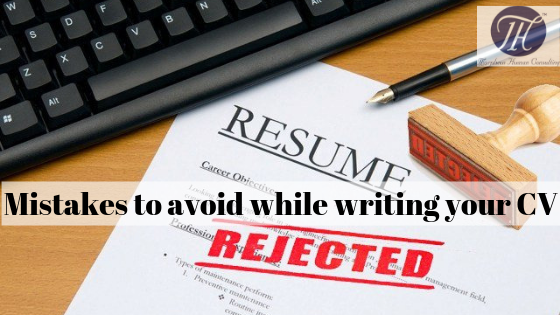Mistakes to avoid while writing your CV

Writing your CV? These are the worst things you can do.
Show your uniqueness, but remain professional; make your document aesthetically pleasing, but keep it simple; brag about yourself, but stay genuine. CV writing is all about balance. Each element is essential, but tip too far in one direction and your candidacy may finish before it can even begin.
As you walk the CV tightrope, there are services to guide you, that offers objective feedback on your CV. In our years of reviewing documents, we’ve noticed trends of the most common ‒ and most damaging ‒ CV errors. These are some of the worst things job seekers include on their CVs and why they are hurting your job search.
1. ‘Objective: To obtain a job in (field) that will allow me to leverage my skills in a rewarding manner.’
These types of personal statements do nothing to help you. In fact, they cost you an opportunity to make your case to HR managers. When you talk about your objective, you’re describing exactly that: your own goals. Unfortunately, HR managers aren’t interested in what you’re hoping to achieve; they have a job to do ‒ a position to fill ‒ and their primary focus will be finding a candidate qualified to execute the needs of the role.
Instead of structuring your personal statement around your own objective, use the space to outline what you can offer an HR manager. Craft a powerful overview of you as a professional, outlining who you are and why you are qualified, and featuring a detailed highlight or two from your experience that demonstrates your abilities.
2. ‘I possess 7 years of (field) experience, where I have worked with clients in (industries).’
When writing a CV, there’s often discussion on whether it’s best to write in the first person (‘I’ and ‘my’) or third person (‘he’, ‘she’ and ‘they’). In fact, your best approach is to eliminate pronouns altogether by using the absent first person. It’s as simple as making a statement as written and omitting the pronouns so that it starts with the verb:
First-person: I increased organic revenue by 15% YoY.
Absent first person: Increased organic revenue by 15% YoY.
The latter example is much more concise, plus you avoid having to repeat yourself with ‘I/He did this’ and ‘I/She did that.’ The pronouns are implied because, after all, this is your CV.
3. Graphics that illustrate your skill proficiencies
A skills bar chart that is 75 per cent full, four of five bubbles filled in, a pie chart that is 90 per cent complete ‒ these are all trendy CV graphics job seekers employ to present their expertise with certain subjects, tools, etc. These images may be visually pleasing, but they are actually detrimental to your CV’s success.
CV-scanning software called applicant tracking systems (ATS) have become increasingly popular, with 98 per cent of large organisations using them in their recruitment processes. This technology works as a kind of CV gatekeeper, parsing documents and tossing aside the candidates deemed least qualified, all based on a search for certain keywords. Your CV’s success is dependent on its ability to meet the requirements of an ATS, and this software cannot read charts, images and other graphics. If you try to get too fancy with your CV design, there’s a chance that important information will be lost.
4. ‘Ambitious, team-spirited, collaborative, hard-working, honest professional seeking…’
Phew ‒ what a mouthful. And yet, nothing was truly said. There is a whole lexicon of CV buzzwords, but the fact of the matter is that they aren’t effective.
Buzzwords (different from the ATS-loved keywords mentioned above) are popular terms that job seekers turn to because they sound impressive. Unfortunately, to an HR manager, they are fluffy, vague statements that don’t hold real substance. Think about it: The idea of being a ‘motivated leader’ is nice, but an HR manager won’t take your word for it ‒ they need to see those qualities demonstrated in your work history.
Rather than fall back on empty buzzwords, leverage strong action verbs like ‘improved’, ‘facilitated’, ‘organised’ and ‘led’ that are both more impactful and give a clearer demonstration of what you have accomplished.
Also, Check out our other blogs on blog.mhc.co.in